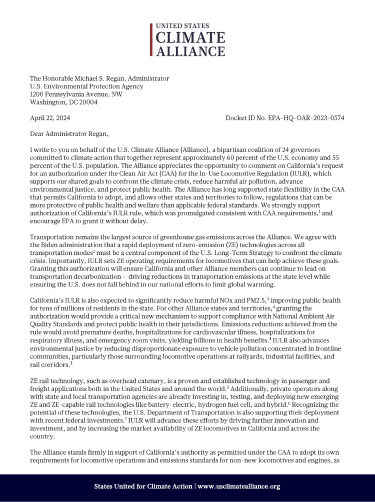Home / U.S. Climate Alliance Requests EPA Approval of California’s In-Use Locomotive Regulation Authorization
- Letter
U.S. Climate Alliance Requests EPA Approval of California’s In-Use Locomotive Regulation Authorization
April 23, 2024
The Alliance has long supported state flexibility in the Clean Air Act (CAA) that permits California to adopt, and allows other states and territories to follow, regulations that can be more protective of public health and welfare than applicable federal standards.
The Alliance stands firmly in support of California’s authority as permitted under the CAA to adopt its own requirements for locomotive operations and emissions standards for non-new locomotives and engines, as well as the authority of other states and territories to voluntarily adopt those regulations. Such regulations can play a vital role in states’ ability to improve air quality, protect public health, advance environmental justice, and tackle climate change.
Read the Alliance’s full letter here.
About the Alliance
Launched in 2017 by the governors of Washington, New York, and California to help fill the void left by the U.S. federal government’s withdrawal from the Paris Agreement, the Alliance has grown to include 24 governors from across the U.S. representing approximately 60 percent of the U.S. economy and 55 percent of the U.S. population. Governors in the Alliance have pledged to collectively reduce net greenhouse gas emissions by at least 26-28 percent by 2025, 50-52 percent by 2030, and 61-66 percent by 2035, all below 2005 levels, and collectively achieve overall net-zero greenhouse gas emissions as soon as practicable, and no later than 2050.
The Alliance’s states and territories continue to advance innovative and impactful climate solutions to grow the economy, create jobs, and protect public health, and have a long record of action and results. In fact, the latest data shows that as of 2023, the Alliance has reduced its collective net greenhouse gas emissions by 24 percent below 2005 levels, while increasing collective GDP by 34 percent, and is on track to meet its near-term climate goal of reducing collective greenhouse gas emissions 26 percent below 2005 levels by 2025.
###
